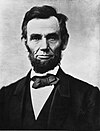James Speed
James Speed | |
|---|---|
 | |
| 27th United States Attorney General | |
| In office December 2, 1864 – July 22, 1866 | |
| President | Abraham Lincoln Andrew Johnson |
| Preceded by | Edward Bates |
| Succeeded by | Henry Stanbery |
| Personal details | |
| Born | March 11, 1812 Jefferson County, Kentucky, U.S. |
| Died | June 25, 1887 (aged 75) Louisville, Kentucky, U.S. |
| Political party | Whig, Republican |
| Spouse | Jane Cochran Speed |
| Alma mater | St. Joseph's College Transylvania University |
| Profession | Lawyer, Professor, Politician |
| Military service | |
| Branch/service | Louisville Home Guard |
| Battles/wars | American Civil War |
James Speed (March 11, 1812 – June 25, 1887) was an American lawyer, politician and professor. In 1864, he was appointed by Abraham Lincoln to be the United States Attorney General. He previously served in the Kentucky Legislature, and in local political office.
Early life
Speed was born in Jefferson County, Kentucky, to Judge John Speed and his second wife, Lucy Gilmer Fry. He was the brother of Joshua Fry Speed, as well as a distant descendant of the English cartographer John Speed. He graduated from St. Joseph's College in Bardstown, Kentucky, studied law at Transylvania University and was admitted to the bar at Louisville, in 1833.[citation needed]
In 1841 Lincoln met Speed in Kentucky when Lincoln visited Speed's brother, Joshua. James Speed lent Lincoln books from his law library.[1] James Speed joined the Whig Party and became a strong opponent of slavery.[citation needed]
Representative
In 1847 Speed was elected to the Kentucky House of Representatives. At this early point in his career, Speed was already agitating for the emancipation of American slaves. Because of these views, his candidacy for becoming a delegate to the 1849 Kentucky Constitutional Convention was rejected. From 1851 to 1854, Speed served on the Louisville Board of Aldermen, including two years as its president. He taught as a professor in the Law Department of the University of Louisville from 1856 to 1858, and would later return to teach from 1872 to 1879. He was one of the founders of the law firm of Stites & Harbison.[citation needed]
Civil War era
As the coming Civil War was increasing in likelihood, Speed worked to keep Kentucky in the Union. He also became a commander of the Louisville Home Guard. Elected to the Kentucky Senate in 1861 he became the leader of the pro-Union forces. In 1862 he controversially introduced a bill to "confiscate the property" of those supporting the Confederacy in Kentucky.[citation needed]
In December 1864, United States President Abraham Lincoln appointed Speed Attorney General of the United States. After the assassination of Lincoln he became associated with the Radical Republicans and advocated the vote for male African Americans. Disillusioned with the increasingly conservative policies of President Andrew Johnson, Speed resigned from the Cabinet in July 1866 and resumed the practice of law.[citation needed]
Post war career
Speed's radical views were unpopular in Kentucky and his attempt to be elected to the Senate in 1867 ended in failure. In 1868, Speed was a candidate for the Republican nomination for Vice President of the United States but lost it to Schuyler Colfax.
Speed was a delegate to the National Union Convention in Philadelphia in 1866 and served as president of the Convention. He was a candidate for U.S. Representative from Kentucky's 5th District in 1870, and was a delegate to Republican National Convention from Kentucky in 1872.
He was elected a 3rd class companion of the Military Order of the Loyal Legion of the United States in recognition of his service to the Union during the Civil War.
Speed died in Louisville in 1887, and is interred at Cave Hill Cemetery in that city.
In popular culture
- Speed was portrayed by William von Hardenburg in the 1924 film The Dramatic Life of Abraham Lincoln.
- The actor John Lescault portrayed Speed in the 1998 television film The Day Lincoln Was Shot.
- In the 2012 film Lincoln, James Speed was portrayed by Richard Topol.
See also
- Farmington Historic Plantation
- List of people from the Louisville metropolitan area
- Louisville in the American Civil War
References
- ^ Donald, David Herbert (1995). Lincoln. New York: Touchstone. p. 88. ISBN 0684808463.
Further reading
- Bush, Bryan S. (2008). Lincoln and the Speeds: The Untold Story of a Devoted and Enduring Friendship. Morley, Missouri: Acclaim Press. ISBN 978-0-9798802-6-1.
- Springer, Helen L. (July 1937). "James Speed, The Attorney General, 1864-1866". Filson Club History Quarterly. 11 (3). Retrieved 2011-11-29.
- "Speed, James". The Encyclopedia of Louisville (1 ed.). 2001.
External links
- Mr. Lincoln's White House: James Speed Biography
- "Joshua and James Speed" — Article by Civil War historian/author Bryan S. Bush
- James Speed at Find a Grave
- 1812 births
- 1887 deaths
- American abolitionists
- Kentucky State Senators
- Louisville, Kentucky in the American Civil War
- Members of the Kentucky House of Representatives
- Politicians from Louisville, Kentucky
- People of Kentucky in the American Civil War
- Union political leaders
- United States Attorneys General
- University of Louisville faculty
- Transylvania University alumni
- Kentucky lawyers
- Burials at Cave Hill Cemetery
- Kentucky Whigs
- Kentucky Republicans
- Lincoln Administration cabinet members
- Andrew Johnson administration cabinet members
- Southern Unionists in the American Civil War



